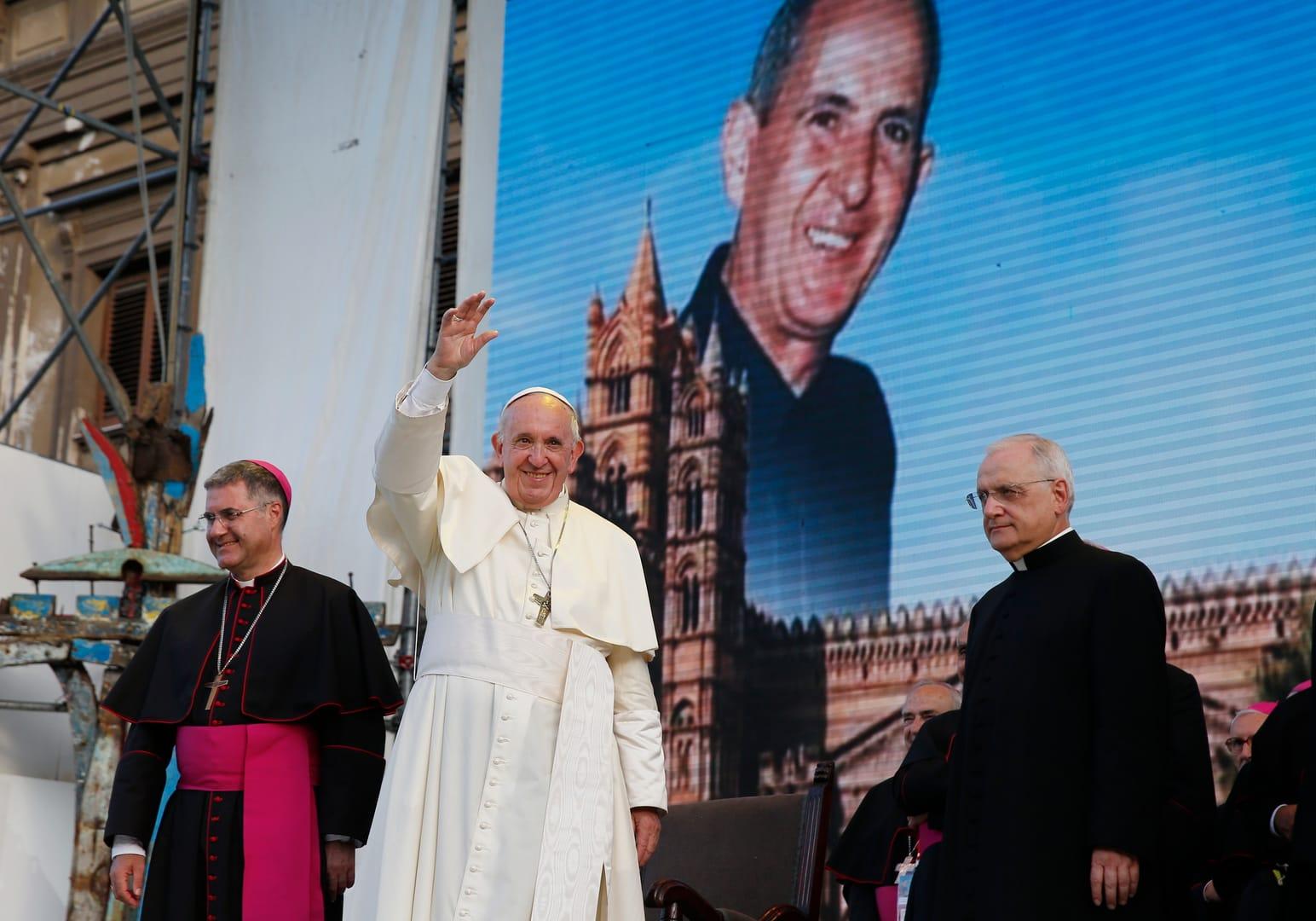ROME – Pope Francis told a group of priests that he doesn’t want to see “grandma’s lace” when Mass is celebrated, saying that although “paying homage” to grandmothers is good, “it is better to celebrate the Holy Mother Church.”
Speaking to the priests and bishops of the Italian island of Sicily, known for its natural beauty but also for being a place where mafia dons have long appropriated both the symbols of Catholicism and ties to ecclesiastical elites to reinforce a grip on power, Francis asked about how the Second Vatican Council had been embraced by the local church.
It is something that “worries me quite a bit,” he said.
“Popular piety is a great treasure, and we must guard it, accompany it so that it is not lost,” he said. “Also educate it,” and “free it from all superstitious gestures and take the substance it has inside.”
This is particularly relevant on this island, often described as its own country, since examples of popular piety intertwined with organized crime abound. For instance, in June 2016, in the Sicilian town of Corleone – the town’s name was used for the fictional mafia family in The Godfather – a procession carrying a statue of St. John the Evangelist took a detour to the house of Salvatore Riina, a former mafia lord also know as u capu di ‘i capi (the boss of bosses) and la bestia (the beast), due to his murderous rampage in the 1990s.
Even though Riina was not home – he has been serving a life sentence in prison since 1993 – the procession stopped and made the saint “kneel” before his home in a dramatic show of respect.
RELATED: No more Godfathers in land of Corleone, Italian bishop decrees
Still talking about the Second Vatican Council, Francis asked the priests about the liturgy. Prefacing the question with an “I don’t know” the law of the land because he doesn’t attend Mass in Sicily, he reminded priests that homilies are supposed to be short – not more than eight minutes – and provide people with substance: A thought, a feeling, or an image they can carry with themselves throughout the week.
Then, saying that he has “seen pictures,” he regretted the fact that priests still wear vestments with lace: “Where are we? Sixty years after the Council! Some updating [is needed] even in liturgical art, in liturgical ‘fashion’!”
“Yes, sometimes bringing some of Grandma’s lace goes, but sometimes,” Francis told the priests. “It’s to pay homage to grandma, right? It’s good to pay homage to grandma, but it’s better to celebrate the mother, the holy mother Church, and to do so how Mother Church wants to be celebrated.”
The pontiff also spoke more broadly about the situation of both society and the church in Sicily, saying that the “changing era” presents challenges that strain social and affective ties.
“We witness in Sicily behaviors and gestures marked by great virtues as well as cruel heinousness,” he said. “Alongside masterpieces of extraordinary artistic beauty, we see scenes of mortifying neglect. And equally, in the face of men and women of great culture, many children and young people evade school, remaining cut off from a decent human life.”
Sicilian everyday life takes on strong hues, he said, with the intense colors of the flowers, fields and sea shining through the strength of the sun’s radiance: “It is no accident that so much blood has been shed at the hands of the violent but also at the humble and heroic resistance of the saints and the just, servants of the church and the state.”
As Francis noted, the island is suffering from depopulation, due both to the decline in births and the massive emigration of young people. Mistrust in institutions reaches high levels and the dysfunction of services burdens the performance of daily practices, “despite the efforts of good and honest people who would like to engage and change the system,” he said.
The church, Francis said, is not immune to the change of epoch, reflected in the decline in vocations to the priesthood and consecrated life, as well as a growing detachment of young people who struggle to find support in parishes in their search for the meaning of life. And sometimes, they also struggle to perceive in the church “the clear distancing from old, erroneous and even immoral ways of acting in order to take decisively the path of justice and honesty.”
Acknowledging that he had received files on priests and church people who have followed a “path of injustice and dishonesty,” Francis also pointed out that both in the past and in the present Sicily has seen no shortage of “priests and faithful who fully embrace the fate of the Sicilian people,” such as Blessed Father Pino Puglisi and Judge Rosario Livatino, both violently murdered by the mafia.
RELATED: Anti-mafia martyr’s anniversary a reminder of Catholic light and shadow
“People still look to priests as spiritual and moral guides, people who can also help improve the civil and social life of the island, support the family and be a reference for growing young people,” he said. “High and demanding is the Sicilian people’s expectation of priests. Please do not stay in the middle of the road!”
Follow Inés San Martín on Twitter: @inesanma












